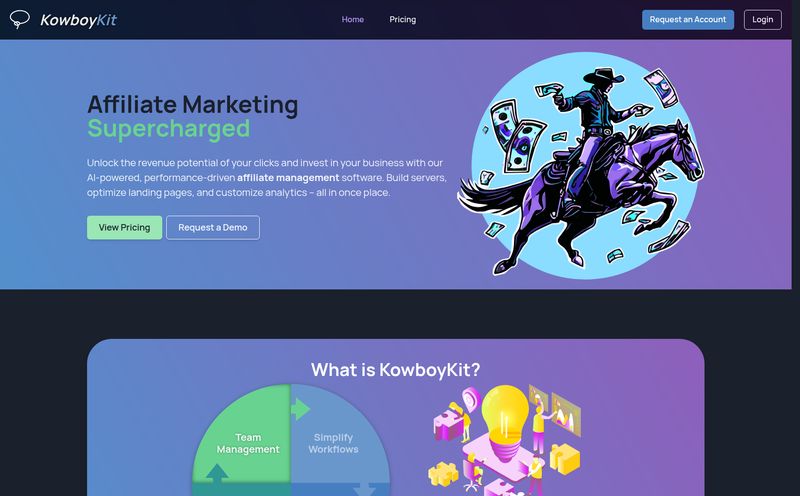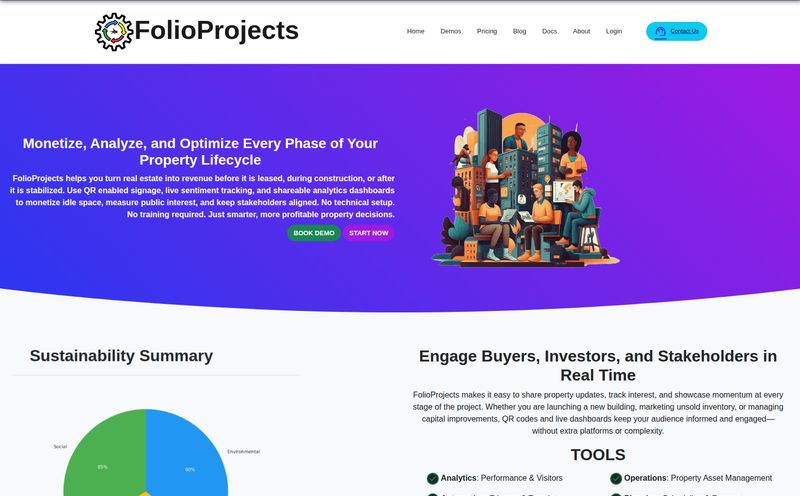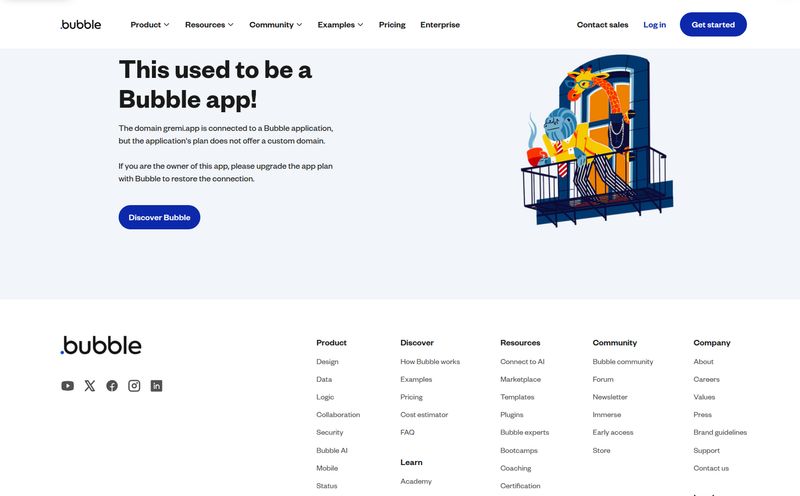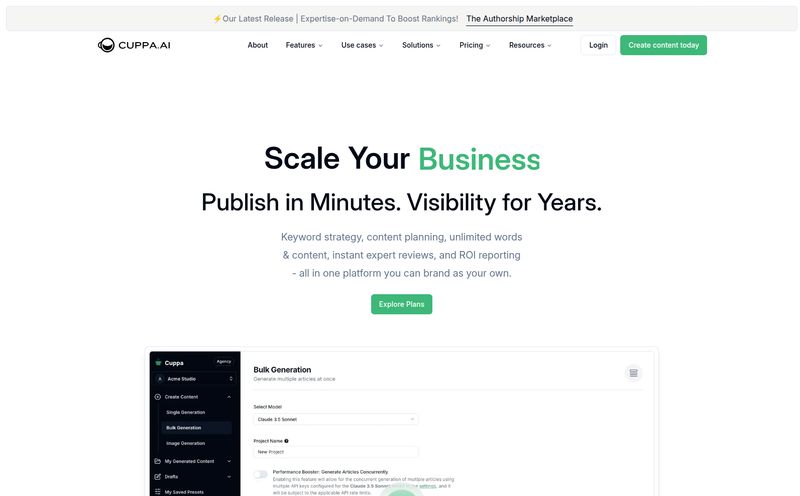As someone who spends an unhealthy amount of time digging through the internet’s digital basements, I get a weird thrill from finding new tools. Especially in the ed-tech space. The promise of smarter, better ways to learn gets my SEO-sense tingling. So, when I first heard whispers of a platform called AI Digital Learning (ADL), I was intrigued. The concept? Genius, really.
A platform dedicated to teaching non-tech professionals the IT skills they need to thrive. Think product managers, marketers, and business analysts who need to speak the language of developers without actually having to be developers. And the secret sauce? An AI-driven curriculum that stays constantly up-to-date. In our fast-moving world, that’s not just a feature; it’s a necessity.
It sounded like the perfect solution for so many people I know. A bridge over the chasm that often separates the marketing department from the dev team. I was ready to check it out, maybe even recommend it. But then I hit a wall. A very expensive, very final-looking wall.
What AI Digital Learning Was Supposed to Be
Before we get to the graveyard, let's talk about the dream. ADL wasn't just another online course library. It was a whole philosophy. The idea was to empower the “non-tech” crowd with real, practical skills. They were focusing on the roles that orchestrate the tech world: product management, marketing, project management and business analytics.
Their approach was built on a few core pillars that, honestly, sound fantastic:
- AI-Integrated Learning: Instead of static, year-old PowerPoints, the content would be continuously updated by AI. This means you’re always learning what’s relevant right now, not what was relevant when the course was first filmed. A huge plus.
- Hands-On, Not Just Hand-Waving: The platform promised real-world projects. I've always felt that the best learning comes from doing, not just reading. Building something, managing a mock project… that’s where the lessons really stick.
- Mentors Who've Been There: They boasted about having expert instructors with actual, in-the-trenches experience. Not just academics, but people who have lived the product lifecycle and can tell you what really happens in a sprint planning meeting. They even offered live mentoring. Gold.
The Perfect Recipe, With a Few Questions
On paper, ADL had all the ingredients for success. It was targeting a massive, underserved market with a modern, practical solution. But even the best recipes can have a few missing steps. When I dug into the details, a couple of potential red flags popped up, even before I discovered the big one.
Here’s a quick breakdown of what I saw as the good and the, well, the questionable.
| What They Got Right (The Pros) | Potential Red Flags (The Cons) |
|---|---|
| Focus on non-tech IT roles was brilliant. Career development support and a Telegram community for networking showed they were thinking about the whole person, not just the skillset. | Vague pricing. This is a big one. Not having clear pricing tiers or course costs on your site is a huge barrier for potential customers. It makes you wonder about the business model. |
| AI-driven content and real-world projects are a powerful combination for effective learning. | The effectiveness depends on student effort. While true for all learning, it can sometimes be code for “the platform isn’t as supportive as it seems.” |
But none of that prepared me for what I found next.
And Then, The GoDaddy Twist…
Curiosity fully stoked, I typed `AiDigitalLearning.com` into my browser, expecting a slick landing page. Instead, I got this:
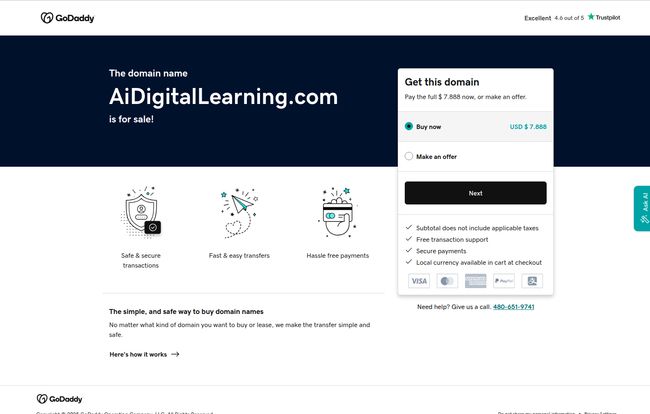
Visit AI Digital Learning
A GoDaddy landing page. The domain name is for sale. For $7,888.
And that, my friends, is where the record scratches. It’s the digital equivalent of showing up to a grand opening and finding a “For Lease” sign in the window. A ghost. All that promise, all that potential, and the front door is locked and being sold to the highest bidder. It's a stark reminder that in the digital world, even the best ideas can vanish into thin air.
So, What Can We Learn From a Digital Ghost?
This isn't just a sad story about a failed startup. For those of us in the marketing, SEO, and entrepreneurial trenches, it’s a valuable, if cautionary, tale. It got me thinking about what we can take away from the spectral presence of AI Digital Learning.
The Peril of an Unclear Business Model
The biggest red flag for me was the lack of clear pricing. If you have a great product, you should be proud of its price because you can justify the value. Hiding your pricing creates friction and distrust. It makes potential customers feel like they're about to be drawn into a high-pressure sales call. Was this the fatal flaw? It's impossible to say for sure, but I can tell you that a clear path to purchase is fundamental. Without it, you’re just a great idea with no income.
The Cutthroat World of Ed-Tech
The online education market is brutal. It's packed with giants like Coursera and Udemy, plus countless niche competitors. You can have the best product in the world, but if you can’t cut through the noise, you're invisible. Customer acquisition costs (CPC) in education are notoriously high. It takes a massive marketing budget and some seriously savvy SEO and ad strategy to gain a foothold. A great idea isn't enough; you need the financial muscle and marketing expertise to back it up.
A Domain is More Than an Address
Seeing that domain up for sale for a premium price tells a story. A nearly $8,000 price tag means someone believes the name itself has value. It’s a great name! It's brandable, keyword-rich, and memorable. But a domain is also a digital tombstone. It’s a public declaration that the project is over. It serves as a lesson that your online real estate is your foundation. When it’s gone, so is the business.
Frequently Asked Questions About a Platform That Isn't
What exactly was AI Digital Learning?
AI Digital Learning was a planned online education platform designed to teach non-technical professionals (like marketers and managers) essential IT and product development skills using an AI-powered, hands-on curriculum.
Why was its approach to non-tech IT education considered unique?
Its uniqueness came from combining three key things: focusing specifically on the non-tech crowd, using AI to keep course content perpetually current, and emphasizing practical, real-world projects over pure theory.
Is the AiDigitalLearning.com domain still for sale?
As of this writing, yes. It's listed on GoDaddy, which suggests the original project is no longer active. It's a prime piece of digital real estate waiting for a new owner.
What are the key takeaways for new online businesses from this?
Three main things: 1) Have a clear and transparent business model, especially your pricing. 2) Be prepared for fierce competition and have a solid marketing plan. 3) Your domain and online presence are your business's lifeline; protect and value it.
What makes a good online learning platform?
In my experience, it's a mix of relevant, up-to-date content, hands-on projects that build real skills, access to expert mentors, and a supportive community to help you along the way. ADL seemed to have the right recipe, even if it never made it out of the kitchen.
Are no-code skills really that valuable for non-tech roles?
Absolutely. Understanding no-code tools and basic IT principles allows marketers, project managers, and others to build, test, and manage projects more independently, making them incredibly valuable assets to any modern company.
A Toast to a Good Idea
So, let's pour one out for AI Digital Learning. A ghost in the ed-tech machine. It’s a shame, because the idea was a damn good one. It's a concept the market still desperately needs. Who knows, maybe someone will buy that domain and resurrect the dream with a solid business plan and a war chest for marketing.
Until then, it stands as a perfect, poignant reminder that a brilliant idea is only the first step. Execution, marketing, and a clear path to profitability are what separate the digital ghosts from the thriving online giants. It’s a lesson we should all take to heart.
Reference and Sources
- Domain Listing: Information sourced from the AiDigitalLearning.com landing page on GoDaddy.
- Platform Details: Analysis based on archived marketing and descriptive data about the proposed AI Digital Learning platform.
- Ed-Tech Market Analysis: For further reading on the competitive nature of the ed-tech industry, I'd suggest checking out reports on outlets like TechCrunch's education section.
